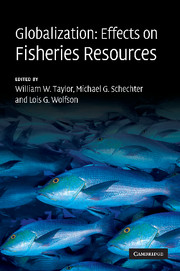Book contents
- Frontmatter
- Contents
- List of contributors
- About the editors
- Foreword
- Preface
- Acknowledgments
- Introduction: Globalization and fisheries: a necessarily interdisciplinary inquiry
- Part I Impacts of globalization on fisheries and aquatic habitats
- Part II Case studies of globalization and fisheries resources
- 7 Possible contributions of globalization in creating and addressing sea horse conservation problems
- 8 Wronging rights and righting wrongs: some lessons on community viability from the colonial era in the Pacific
- 9 Cooperation and conflict between large- and small-scale fisheries: a Southeast Asian example
- 10 Response of Alaskan fishermen to aquaculture and the salmon crisis
- 11 Tilapia: a fish with global reach
- 12 The influence of globalization on the sustainability of North Pacific salmon fisheries
- Part III Governance and multilevel management systems
- Part IV Ethical, economic, and policy implications
- Part V Conclusions and recommendations
- Index
- Plate section
- References
12 - The influence of globalization on the sustainability of North Pacific salmon fisheries
Published online by Cambridge University Press: 10 August 2009
- Frontmatter
- Contents
- List of contributors
- About the editors
- Foreword
- Preface
- Acknowledgments
- Introduction: Globalization and fisheries: a necessarily interdisciplinary inquiry
- Part I Impacts of globalization on fisheries and aquatic habitats
- Part II Case studies of globalization and fisheries resources
- 7 Possible contributions of globalization in creating and addressing sea horse conservation problems
- 8 Wronging rights and righting wrongs: some lessons on community viability from the colonial era in the Pacific
- 9 Cooperation and conflict between large- and small-scale fisheries: a Southeast Asian example
- 10 Response of Alaskan fishermen to aquaculture and the salmon crisis
- 11 Tilapia: a fish with global reach
- 12 The influence of globalization on the sustainability of North Pacific salmon fisheries
- Part III Governance and multilevel management systems
- Part IV Ethical, economic, and policy implications
- Part V Conclusions and recommendations
- Index
- Plate section
- References
Summary
INTRODUCTION
Throughout history, people in every corner of the world have been harvesting fish for nourishment and economic well-being. These reasons for fishing have persisted, and global fishing activity continues to support people's social, biological, and economic welfare. Fisheries have evolved over time into complex and often interlocking supply chains involving wild and captive production, harvesting, processing, marketing, and distribution systems. This evolution has been largely due to increases in the global consumption of fish products; the development of policies, agreements, and other political tools that facilitate trade between countries; and increases in the financial investments and subsidies for the development of fish production, location, capture, and processing technologies (Arbo and Hersoug 1997; Stone 1997; Harris 1999; Cole 2003; and see Taylor et al., Chapter 1). These technological and governance advancements increase the geographical distribution and intensity of fishing, and the resulting fishing activity has frequently outpaced the natural production of fish biomass. Therefore, many regions of the world are now experiencing the consequences of commercial overfishing, such as fish stock depletion, socioeconomic hardships in fishing communities, and political intervention (Hanna 1997).
The term “globalization” implies that local events affect and are affected by events in other regions. This concept applies to several complex and interrelated aspects of commercial fisheries. For example, ecological globalization of fisheries results when habitat modification and overfishing in one region can significantly affect the population status of highly migratory fish stocks such as salmon throughout their range.
- Type
- Chapter
- Information
- Globalization: Effects on Fisheries Resources , pp. 291 - 302Publisher: Cambridge University PressPrint publication year: 2007



